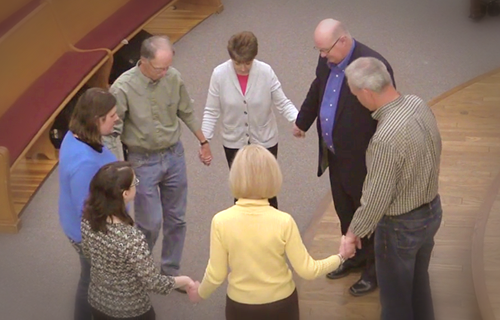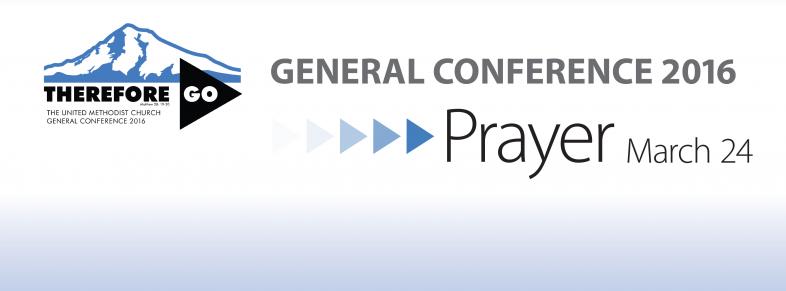
Them and us: Bishop Ough
 The United Methodist Church is a few short weeks away from our quadrennial General Conference. Delegates from across our global connection will gather in Portland, Oregon in early May to seek and legislate God’s leading for our 250-year renewal movement. Many of you have committed to praying for the General Conference and its delegates on March 24. I have been praying for some time that God’s Spirit will break through at General Conference and unify our great Church around our mission of making disciples of Jesus Christ for the transformation of the world. If you would like to join our Prayer Vigil, please go to this link. Photos from Dakotas Conference Communications.
The United Methodist Church is a few short weeks away from our quadrennial General Conference. Delegates from across our global connection will gather in Portland, Oregon in early May to seek and legislate God’s leading for our 250-year renewal movement. Many of you have committed to praying for the General Conference and its delegates on March 24. I have been praying for some time that God’s Spirit will break through at General Conference and unify our great Church around our mission of making disciples of Jesus Christ for the transformation of the world. If you would like to join our Prayer Vigil, please go to this link. Photos from Dakotas Conference Communications.
Like many previous General Conferences, the 2016 conference will be confronted with several difficult and divisive issues, including homosexuality, the global nature of our church, and how to structure and fund our mission. Over 1,000 petitions* from individuals, local churches, annual conferences and agencies of the church will drive the conference agenda, debate and discernment. There will be high moments of worship and celebrating the life-giving, life-changing impact of our world-wide mission. And, there will be low moments of partisan debate and disruptive behavior.
 Heading into General Conference, I find it helpful and instructive to remember this is not the first general conference of the Church. One of the very first was the Jerusalem Council reported in the 15th chapter of The Acts of the Apostles.
Heading into General Conference, I find it helpful and instructive to remember this is not the first general conference of the Church. One of the very first was the Jerusalem Council reported in the 15th chapter of The Acts of the Apostles.
In the midst of the bitter controversy over whether Gentiles who had converted to Christianity should be instructed to keep the law of Moses and be circumcised, Peter rose to speak. He reminded the apostles and elders that God “made no distinction between them and us.” (Acts 15:9b, NRSV). Peter reminded the Council that God had purified the pagans’ hearts by faith and approved of them by giving the Holy Spirit to them, just as he had to the Jews. The body fell silent and concluded that God had spoken – “for it has seemed good to the Holy Spirit and to us” (Acts 15:28, NRSV).
This is one of the earliest them and us stories in the long trajectory of the Church. Them and us controversies generally develop within the community of faith when we cannot agree upon the core mission and vision of the Church or the nature and expansiveness of God’s grace in Christ. We seem to have forgotten that, within the body of Christ, unity is not built around the urgency created by opposing positions, but rather, unity is built around the urgency to witness to Christ’s transforming power and saving grace.
 The Jerusalem Council is also one of the earliest experiments of corporate discernment and conferment within the Church. Discernment is simply being attentive to and responsive to the Holy Spirit’s speaking within and through us. Peter guided the apostles and elders to resolve this watershed them and us issue by listening, waiting, hoping, preparing and praying for something to happen. I find it instructive that the Jerusalem Council did not arrive at a common mind and direction through the means we too often employ in our conferences. Although we do not have the transcripts from the Council, there appears to be no evidence of trying to achieve unity and direction through legislating solutions, proposing schism or disrupting debate. The Council focused on the evidence of the Holy Spirit in the new believers and their salvation through the grace of the Lord Jesus. Christian conferencing can only take place when believers embrace dialogue as not only an exchange of ideas and opinions, but more as a gift exchange, looking for the Spirit gifts in one another.
The Jerusalem Council is also one of the earliest experiments of corporate discernment and conferment within the Church. Discernment is simply being attentive to and responsive to the Holy Spirit’s speaking within and through us. Peter guided the apostles and elders to resolve this watershed them and us issue by listening, waiting, hoping, preparing and praying for something to happen. I find it instructive that the Jerusalem Council did not arrive at a common mind and direction through the means we too often employ in our conferences. Although we do not have the transcripts from the Council, there appears to be no evidence of trying to achieve unity and direction through legislating solutions, proposing schism or disrupting debate. The Council focused on the evidence of the Holy Spirit in the new believers and their salvation through the grace of the Lord Jesus. Christian conferencing can only take place when believers embrace dialogue as not only an exchange of ideas and opinions, but more as a gift exchange, looking for the Spirit gifts in one another.
The United Methodist Church is fraught with many them and us controversies. Controversies over whom we will include or exclude, issues over biblical authority and biblical obedience, tensions over how we witness to a broken world, struggles over how to create an authentic global church, controversies over how and who will lead the church. These controversies will dominate and, perhaps, derail our Christian conferencing unless we keep our eyes and hearts focused on our core mission.
 I believe God is calling all of us, and particularly those we have elected to represent us at General Conference, to listen, deeply listen – not to the voices of self-interest and power politics, but to what the Holy Spirit is speaking deep within each of us. I invite you to join me in praying that we will all stay attuned to the call of God’s indwelling Spirit. And, that God will lead the beloved community – the Church –toward a renewed energy and focus that is beyond our “them and us” tendencies, beyond our divisions, beyond our limited imagination, beyond our obsession with politics, planning, power and prediction.
I believe God is calling all of us, and particularly those we have elected to represent us at General Conference, to listen, deeply listen – not to the voices of self-interest and power politics, but to what the Holy Spirit is speaking deep within each of us. I invite you to join me in praying that we will all stay attuned to the call of God’s indwelling Spirit. And, that God will lead the beloved community – the Church –toward a renewed energy and focus that is beyond our “them and us” tendencies, beyond our divisions, beyond our limited imagination, beyond our obsession with politics, planning, power and prediction.
May God raise up among the General Conference delegates another generation of Peters who can lead the church to conclude “for it has seemed good to the Holy Spirit and to us” (Acts 15:28, NRSV).
Bishop Bruce R. Ough
Dakotas-Minnesota Area
March, 2016
* Download the 43MB pdf "Daily Christian Advocate Handbook for Delegates" here.